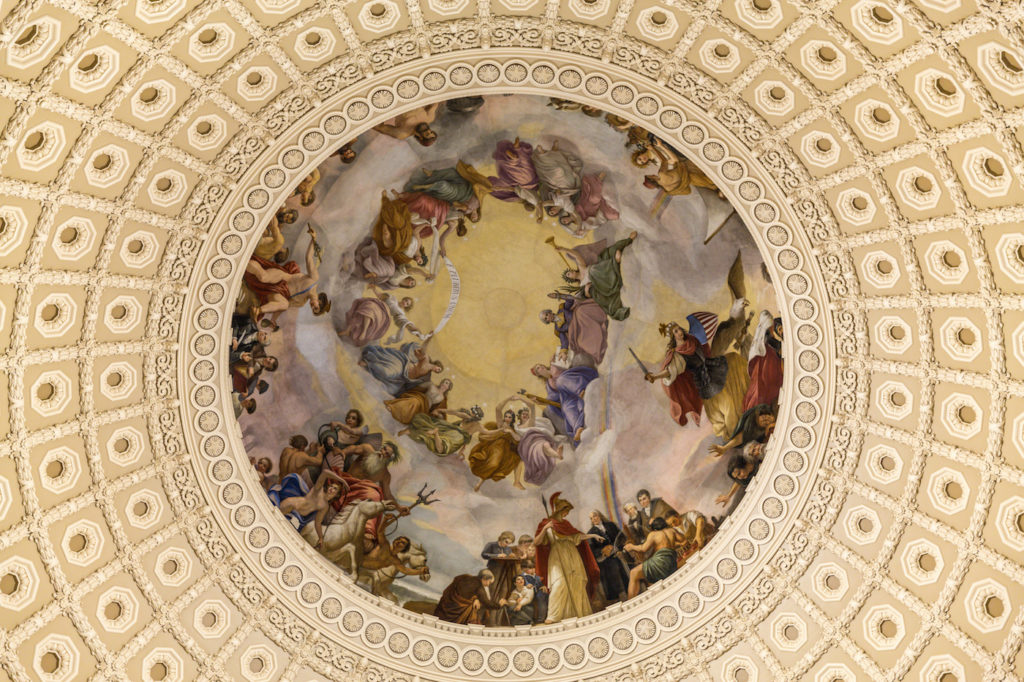Law professor Stephen D. Smith’s latest book carries a provocative title: Fictions, Lies, and the Authority of Law. It resonates with people. A fellow passenger who observed the book in my lap on a recent flight correctly inferred the book’s gist from the title, which prompted her to rattle off a list of mendacious actions of federal and state officials that have led her to believe that “all three branches of government are broken.” She is not the only American who holds that view.
A Book for Our Time and All Times
Indeed, lawlessness is rampant. In the last couple of years, we have witnessed an anarchy experiment in the streets of Seattle, widespread looting and destruction around the country, and a riot at the United States Capitol. Meanwhile, executive officials have responded to the novel coronavirus pandemic with quarantine lockdowns and vaccine mandates that legislatures did not authorize, and many public officials have flouted those same directives as if the rules do not apply to them.
We live in lawless times. But what else is new? Our time may be more lawless than recent decades, but lawlessness is a problem as old as human existence.
Start your day with Public Discourse
Sign up and get our daily essays sent straight to your inbox.Consider the lament of an English jurist who has marveled at the “novel phenomenon” in which “large classes of otherwise respectable persons now hold the belief and act on the conviction that it is not only allowable, but even highly praiseworthy, to break the law of the land if the law-breaker is pursuing some end which to him or her seems to be just and desirable.” Among other examples, the jurist noted, “Conscientious objectors are doing a good deal to render ineffective the vaccination laws.”
The jurist was A. V. Dicey. The year was 1914.
Going back a bit more, we find King George III lambasting American colonists for their lawlessness while he flouted established doctrines of the common law that stand above the crown. Earlier still, the same type of lawlessness cost Charles I his head after a trial that arguably was not legally authorized.
We live in lawless times. But what else is new? Our time may be more lawless than recent decades, but lawlessness is a problem as old as human existence.
Fortunately, we have many examples of courageous lawfulness during lawless times. Those who operated the Underground Railroad in frustration of the Fugitive Slave Act, sharing with the slaves a measure of the danger of punishment, adumbrated the apology of Martin Luther King’s letter from a Birmingham jail, where he sat willingly in submission to a law that he could not in conscience obey. In scripture, we meet Saint Paul asserting his rights as a Roman citizen when faced with unlawful prosecution, but ultimately submitting to unjust judgment. Before that came Crito’s unsuccessful attempt to persuade Socrates to flee from Athens rather than submit to a lawless verdict.
Fictions, Truth, and Lies
Contrary to the spirit of our time, those heroes understood two important truths. First, the principles of natural law and divine law, and some of their fully determined implications, are not contingent on personal opinion or convention. Good is not evil, and right is not wrong. And second, though the rule of law is a fragile and costly achievement, the rule of men is more costly still. In times of lawlessness when everyone decides for themselves what is just, people suffer. Injurious wrongs go unpunished and bad men are emboldened. Officials invent ways to work around their duties and the limits on their powers, or they simply change the rules without warrant, and tyranny is born.
The law must stand above the powerful, and we should worry when the law is suspended or disregarded. But where is the law to be found? Most of the law consists of important fictions that live in the minds of lawyers. Laws are not solid things like gold or guns. We treat a property owner as if she were in possession of her things, even when she isn’t. We treat corporations and trusts as if they were persons, though they have no physical bodies. And, as Smith forcefully argues, we proceed as if our governments enjoy the consent of all the governed, even though they do not.
If the authority of law is a fiction then it is a very useful fiction, especially when our legal artifacts secure the genuine human goods of flesh-and-blood people and communities of people. Yet, as Smith argues, a good legal fiction must be both plausible and beneficial, else we have little reason to play along with it. But what makes the fiction plausible? And how is the law’s benefit to be assessed unless we measure it against fixed, non-conventional, non-fictional standards of justice?
Smith does not go for the classic answer to these questions. He mentions natural law in passing but instead enlists the value of authenticity. Fiction degenerates into pervasive mendacity when the law is used to coerce people into saying things they really do not believe and performing acts they would not do but for the consequences of disobedience.
By this measure, our own legal culture increasingly resembles the systems of enforced lies that characterized the totalitarian regimes of the twentieth century. Powerful elites use legal institutions to silence important truths about human nature and dignity and to require affirmation of things that reasonable people cannot believe. Smith gives the examples of mandatory “inclusiveness” training, which classifies people according to race, and the forced affirmation of puberty blockers for young people.
As Smith argues, a good legal fiction must be both plausible and beneficial, else we have little reason to play along with it. But what makes the fiction plausible?
Thus, Smith’s critique does rest ultimately on one fixed foundation stone: truth. Smith states that the “essential feature” of humanity and human dignity is a correct “relation to truth.” This is why unjust law is so unjust. Legal fictions are not lies. But neither are they real in the fullest sense, so they are easily manipulated for bad ends. Drawing from Vaclav Havel, Hannah Arendt, and other critics of totalitarian government, Smith argues that “a government that forces human beings on a pervasive and daily basis to ‘live with lies’ has not merely injured them; it has deprived them of that feature that constitutes their distinctive humanity.” Furthermore, mendacious governments get more than they bargain for. Once the law mandates lies, the “dishonesty becomes difficult to contain.”
“Just Because” Authority
Smith’s concern about the dangerous tendencies of fictitious authorities motivates his search for real authority, something Arendt claimed “has vanished from the modern world.” Smith identifies real authority as authority for its own sake, an intrinsic reason that we would accept as sufficient without regard to any more basic good or more ultimate end. We would have real authority if the mere say-so of the person in authority were the reason for our actions. Smith calls this “‘just because’ authority.” Real authority also must also have a vertical dimension; it does not exist between equals. And it must pertain between persons. Neither mechanical control nor material causes can be characterized as authority.
According to Smith’s criteria, none of the now-accepted accounts of political and legal authority has room for real authority. Consent of the governed is itself a fiction and, even if it were perfected in reality, the work of justification for our government and laws would be performed by consent and autonomy, not by the inherent authority of government itself. Smith also discusses the natural law account of authority set out by philosopher John Finnis, which focuses on the need for coordination, and the service conception associated with philosopher Joseph Raz, which explains authority as a way of helping us to achieve our goals more effectively than we can on our own. Neither of those accounts gives us real authority, Smith concludes, because they both treat authority as an instrumental means to achieve some more ultimate end, the common good or achievement of our own best interests, respectively.
In Smith’s account, contemporary law is fictions all the way down. This conclusion has a number of disquieting implications. One is that the search for the objective meaning of legal texts such as the U.S. Constitution is a fool’s errand. When we inquire into constitutional meaning, Smith argues, “there is no fact that can conclusively show that one answer is correct and another answer is mistaken.”
What seems like authority turns out to be gratitude, consent, or “simply illegitimate authoritarianism.” Even deference to superior wisdom is not obedience to authority for its own sake.
Though political authority rests in fictions, we do encounter real authority in the world. Children have parents, and many parents exercise their responsibilities well. And anyone who has worked in a large organization knows that the person who holds the highest office—the greatest artificial authority—is not always (or even often) the same person to whom others turn for leadership in times of difficulty or crisis. Experience teaches us that natural authority is a real phenomenon, for we can distinguish it from what Smith calls “faux” authority.
Nevertheless, by Smith’s criteria, there is no “genuine ‘just because’ authority.” Real authority “couldn’t exist,” Smith concludes; “not even God could have it.” Even if it could be found, obedience may turn out to be mere servility, which is “degraded or perverted” rather than “admirable or ennobling.” What seems like authority turns out to be gratitude, consent, or “simply illegitimate authoritarianism.” Even deference to superior wisdom is not obedience to authority for its own sake. A child should follow a parent’s instructions “because doing so is likely to conduce to his or her own interests and welfare.”
Smith observes that many Eastern cultures have preserved the virtue of filial piety, by which children honor parents and elders for intrinsic reasons, just as Westerners (still) act for the sake of friendship. And many religious people obey God because they understand their relationship to him as a “vertical friendship,” even in the West. But overall, Smith thinks that “egalitarian autonomy” has rendered authority “a beleaguered and obfuscated reality.”
The Necessary Authority of Reason
But what if some authority and rules are natural, not in the sense of being good in themselves, but rather in the sense that they declare necessary laws? In the juristic tradition stretching from Justinian to modern jurists such as Vattel and Blackstone, some laws are necessary because they are the only means that reason can discern to achieve and preserve certain natural goods. Law must prohibit murder and defamation, for example, to preserve life, truth, and civic friendship. If the jurists are correct, then, though law may not satisfy Smith’s rigorous criteria for genuineness, at least some laws may be required by reason and in that sense be natural and self-evident to everyone.
Furthermore, the good ends that guide human reason toward human flourishing suggest to rational minds certain legal and political solutions to recurring practical problems. We can understand the rational meaning and ends of many legal fictions, such as corporations, property ownership, and civic marriage, by reference to the human goods that those legal fictions serve. And we can distinguish the natural authority of parents and others who are responsible for communities organized around basic goods from the political authority of governments, which serve only the instrumental good of securing the conditions necessary for more basic communities to flourish.
That is an alternative to Smith’s account; it diminishes neither his insights nor the accessibility of his book. The conversational tone of Smith’s writing invites readers to engage with profound truths. He has done the hard work of reading and digesting the great thinkers on the problem of authority. Both experts and novices to this centuries-old discourse will find in Smith’s book more than adequate compensation for the time and effort they put into reading it. And if you display the book’s provocative cover on your next flight or train ride, you might make a new friend.














